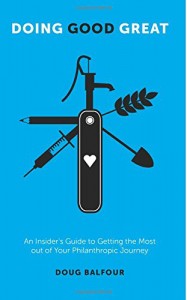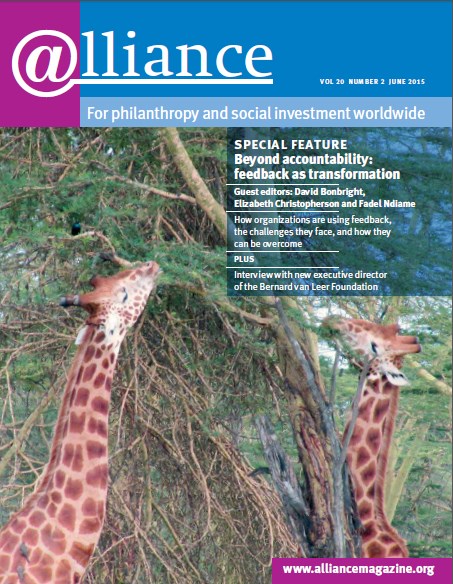Reviewed by Michael Alberg-Seberich
As a closet Trekkie I always sensed a connection between Gene Roddenberry’s science fiction saga Star Trek and philanthropy. Exploring the various unknowns in our world is part of philanthropy. It seems I’m not alone. Doug Balfour, owner and CEO of the consultancy Geneva Global, links the two using Star Trek’s tri-level chess board as a leitmotif in this well written, hands-on and passionate book on ‘performance philanthropy’.
 Despite the science fiction reference, the book is no work of fiction. It is a close-up of how philanthropy contributes to solving tough challenges in the field of international development. It is a book of stories, creating a personal connection with the reader to a degree unusual in philanthropy. While appealing to the donor, this book may startle the academic.
Despite the science fiction reference, the book is no work of fiction. It is a close-up of how philanthropy contributes to solving tough challenges in the field of international development. It is a book of stories, creating a personal connection with the reader to a degree unusual in philanthropy. While appealing to the donor, this book may startle the academic.
The book has three interwoven storylines. The first is autobiographical; this part of the book is personal, even private. The author, for instance, describes the impact of his parents’ separation on his own urge for independence, and he underlines his Christian faith as the basis for his life and work. He talks about his work as a geologist in Namibia, an MBA student, a financial analyst, a management consultant and the CEO of a large international faith-based NGO. These create for the reader a picture of a restless entrepreneur in the field of philanthropy consulting.
The second storyline is about the actual consultancy work. The author presents several cases where Geneva Global helped donors to tackle issues like schooling, rare diseases or human trafficking. These are not MBA-standard business cases. Nevertheless these notes from the field are informative. One case describes how the author’s team developed a strategy for tackling challenges within the education system in Ethiopia. The aim was to find a way to allow children to get back to school after a war, a famine or an epidemic so that they could finish school. The author runs the reader through the analysis of data, the lessons from field experience, the identification of partners and the search for already working solutions. The result of this process was a ‘nine months accelerated learning course, a Speed School’. It provides a good example of a strategic, context-based approach to a social challenge.
The third storyline is about the concept of ‘performance philanthropy’. It is the analytical frame for the cases, which he calls ‘a rigorous and results-oriented approach to creating positive social impact’. The eight principles of this concept are: ‘investment thinking’, ‘methodical measuring’, ‘successful failing’, ‘local implementing’, ‘strategic planning’, ‘deliberate multiplying’, ‘active collaborating’ and ‘forward looking’. Does this sound familiar? While they are a perfect fit with the author’s life, they are also comparable to the principles outlined in many articles and books by philanthropy consultants and researchers (myself included). The good news is that behind this similarity of label, there is a consistency of approach. Balfour describes his in detail and gives it a context.
This context leads us back to the Star Trek tri-level chess game. Balfour uses it to visualize the various complexities of changing systems in this world for the better, a metaphor for three-, four- and five-dimensional thinking on philanthropy to solve societal challenges. His book brings alive this systems thinking by rooting it in human stories, including his own, and in compelling examples of positive change in international development.
By way of a footnote, Balfour’s book raises an interesting question about the role of philanthropists in setting up philanthropy consultancies. Geneva Global was initiated by the philanthropists Richard and Christopher Chandler and Sir John Templeton. I sense a pattern around the world of philanthropists identifying the need for such professional support.
Michael Alberg-Seberich is managing partner of Active Philanthropy. Email alberg-seberich@activephilanthropy.org
About the book
Published by Geneva Global/Wayne
Price $14.99
ISBN 9780986377105
To order http://www.genevaglobal.com/doinggoodgreat







Comments (0)